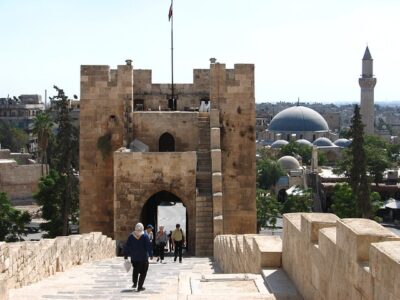 It was not long ago that Syria’s leader, Bashar al-Assad, was a favourite in the West, and perhaps even more so his wife, Asma, who was interviewed in newspapers and held up as the “rose of the desert”. Damascus was considered one of the safest cities in the Middle East, and Bashar sometimes walked around without a bodyguard, and was obviously very popular with the people. Trained as an ophthalmologist in London, perhaps he was not always the cruel dictator he is now portrayed as? And possibly not the most willing candidate to take over and lead the country? His brother Bassel was raised as the future heir to his father Hafez al-Assad, but he died in a car accident.
It was not long ago that Syria’s leader, Bashar al-Assad, was a favourite in the West, and perhaps even more so his wife, Asma, who was interviewed in newspapers and held up as the “rose of the desert”. Damascus was considered one of the safest cities in the Middle East, and Bashar sometimes walked around without a bodyguard, and was obviously very popular with the people. Trained as an ophthalmologist in London, perhaps he was not always the cruel dictator he is now portrayed as? And possibly not the most willing candidate to take over and lead the country? His brother Bassel was raised as the future heir to his father Hafez al-Assad, but he died in a car accident.
What really happened? Now the country is in complete collapse, with various militant groups taking over after years of ‘civil war’. The Syrian army suddenly laid down its arms and surrendered within a week. The conflict seems incomprehensible to most, we hardly have all the answers, but let’s throw some balls in the air.
A natural gas pipeline was to be built through the country from the south to Turkey, but this did not materialise, and there are of course strong regional interests in linking southern oil and natural gas producing countries up to Europe. Perhaps Syria was an unseemly piece of the geopolitical puzzle?
The rebels were a motley crew, gathered from all over the world, often religious extremists hungry for war. We know that the US, Turkey and Israel had a hand in it. The Syrian uprising of 2011 seemed orchestrated like so many other uprisings around the world at the time. And the Western media went along with it, perhaps exaggerating the Syrian government’s evil and bloodlust.
The Russians have long been allies of the Syrians, and they have had a military base in the country since the days of the Cold War. For now, it is operating as usual, according to the Russians. Whether it will remain in the future, however, is uncertain. If the facility closes, the Russian presence in the Mediterranean will be minimised. And this is a victory for the Western powers, if the Russians are the enemy, that is. Most American wars have a haphazard and pointless quality about them. They are often about hitting hard, and after a few years bringing the troops home, leaving the country in ruins. In this case, however, a strategic military objective has been achieved, which is an unusual victory for President Biden and the US.
Iran is seen as the big loser in the regional conflict, having previously been allied with Syria and able to transport weapons to various allies in the region. Now Israel has free airspace all the way to Iran, at least in the short term. The hawks in Washington have long dreamed of war with Iran, and they are reluctant to let go of that idea, even though times and circumstances have changed. Iran is seen as an axis of evil and one of its best friends has now fallen.
Israel of course has an interest in a militarily weaker neighbour, it has already annexed a buffer zone along the border, but the question is whether an unpredictable rebel-ruled country is better? It is not certain that the military situation will be strengthened for Israel. Nor for Turkey, which has played an important role in the north. Their intervention in Syria was triggered by the Syrian government’s handling of the 2011 uprising. The countries used to be good friends. We know what happened in Libya, for example, after the US invasion, leaving the country divided with local rebel chieftains, economic collapse and a revived slave trade. That could yet be Syria’s fate. Neighbouring such a country is rarely desirable.
Bashar al-Assad has angered the Western powers. And it’s probably not just about being a bad dictator, which he was, but there are many bad dictators that nobody cares about, there’s more to it.







